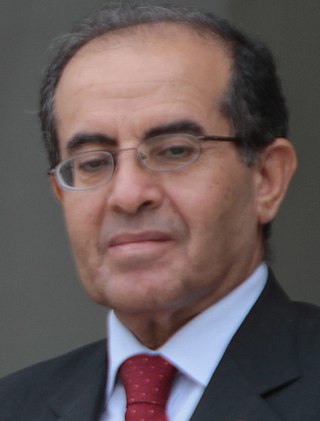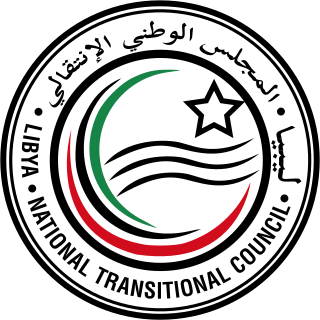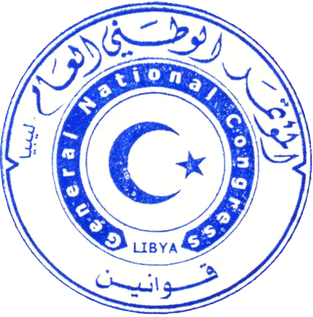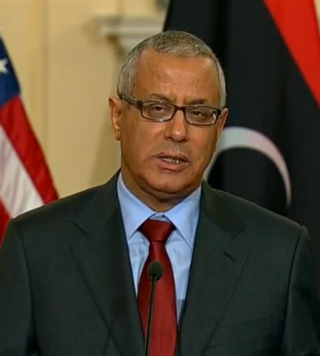
The politics of Libya has been in an uncertain state since the collapse of the Libyan Arab Jamahiriya in 2011 and a recent civil war and various jihadists and tribal elements controlling parts of the country. On 10 March 2021, the interim Government of National Unity (GNU), unifying the Second Al-Thani Cabinet and the Government of National Accord was formed, only to face new opposition in Government of National Stability, until Libyan Political Dialogue Forum assured the ongoing ceasefire.

The National Transitional Council (NTC) was a transitional government established in the 2011 Libyan civil war. The rebel forces overthrew the Libyan Arab Jamahiriya of Muammar Gaddafi. The NTC governed Libya for a period of ten months after the end of the war, holding elections to a General National Congress on 7 July 2012, and handing power to the newly elected assembly on 8 August.

Mahmoud Jibril el-Warfally, also transcribed Jabril or Jebril or Gebril, was a Libyan politician who served as the interim Prime Minister of Libya for seven and a half months during the overthrow of Muammar Gaddafi and the Libyan Civil War, chairing the executive board of the National Transitional Council (NTC) from 5 March to 23 October 2011. He also served as the Head of International Affairs. As of July 2012, Jibril was the head of one of the largest political parties in Libya, the National Forces Alliance.

Ali Abdussalam Tarhouni is a Libyan economist and politician. Tarhouni served as the minister for oil and finance on the National Transitional Council, the provisional governing authority in Libya, from 23 March to 22 November 2011. He acted in the capacity of interim prime minister of Libya during the departure of outgoing incumbent Mahmoud Jibril from 23 October 2011 until Abdurrahim El-Keib was formally named to succeed Jibril on 31 October.

The aftermath of the 2011 Libyan civil war has been characterized by marked change in the social and political order of Libya after the overthrow and killing of Muammar Gaddafi in the civil war that was fought in Libya in 2011. The country has been subject to ongoing proliferation of weapons, Islamic insurgencies, sectarian violence, and lawlessness, with spillovers affecting neighboring countries including Mali.

Elections for a General National Congress (GNC) were held in Libya on 7 July 2012, having been postponed from 19 June. They were the first elections since the overthrow and death of longtime ruler Muammar Gaddafi a year earlier, the first free national elections since 1952, and only the second free national elections since Libya gained independence in 1951.
The Justice and Construction Party (JCP) or Justice and Development Party is a political party in Libya associated with the Muslim Brotherhood. It was officially founded on 3 March 2012 in Tripoli.

The General National Congress or General National Council was the legislative authority of Libya for two years following the end of the First Libyan Civil War. It was elected by popular vote on 7 July 2012, and took power from the National Transitional Council on 8 August.

Ali Zeidan is a former Prime Minister of Libya. He was appointed by the General National Congress on 14 October 2012, and took office on 14 November after Congress approved his cabinet nominees. Prior to the Libyan Civil War, Zeidan was a Geneva-based human rights lawyer and according to the BBC, he is considered by some local observers as a strong-minded liberal. He was ousted by the parliament committee and fled from Libya on 14 March 2014. However, he told the press conference in Rabat, Morocco, that the ousting was invalid.

Ahmed Omar Maiteeg is a Libyan businessman and politician originally from Misrata, who was elected Prime Minister of Libya in May 2014. He was appointed head of the transitional government, and asked to form his cabinet and present it to the GNC for a confidence vote within 15 days.

The Libyan House of Representatives (HoR) is the legislature of Libya resulting from the 2014 Libyan parliamentary election, which had an 18% turnout. In late 2014, following the failed coup attempt to take over the capital Tripoli in the context of the Libyan Civil War, the House of Representatives relocated itself to Tobruk in the far east of Libya. Several HoR sessions were held in Tripoli in May 2019 while Tripoli was under armed attack, electing an Interim Speaker for 45 days. Between 2014 and 2021, the House of Representatives supported the Tobruk-based government led by Abdullah al-Thani before supporting the incumbent Government of National Unity led by Abdul Hamid Dbeibeh. In September 2021, the House of Representatives passed a no-confidence motion against the interim GNU government.

Abdullah al-Thani is a Libyan politician who became prime minister of the House of Representatives of Libya on 11 March 2014, when he took over in an interim capacity after the dismissal of Ali Zeidan. He was previously the defence minister in the government of Zeidan.

Fayez Mustafa al-Sarraj is a Libyan politician who served as the Chairman of the Presidential Council of Libya and Head of Government of the Government of National Accord from 2016 to 2021, which was formed on 17 December 2015 under the Libyan Political Agreement. He has been a member of the Parliament of Tripoli.

The Government of National Accord was an interim government for Libya that was formed under the terms of the Libyan Political Agreement, a United Nations–led initiative, signed on 17 December 2015. The agreement was unanimously endorsed by the United Nations Security Council, which welcomed the formation of a Presidency Council for Libya and recognized the Government of National Accord as the sole legitimate executive authority in Libya. On 31 December 2015, Chairman of the Libyan House of Representatives, Aguila Saleh Issa declared his support for the Libyan Political Agreement. The General National Congress has criticized the GNA on multiple fronts as biased in favor of its rival parliament the House of Representatives.

The Libyan presidential election had originally been planned for 10 December 2018, but was delayed due to Khalifa Haftar's Western Libya campaign. The election was thereafter scheduled to be held on 24 December 2021 but was indefinitely postponed after the head of the High National Election Commission (HNEC) ordered the dissolution of the electoral committees nationwide.

Fathi Ali Abdul Salam Bashagha, known simply as "Fathi Bashagha" or occasionally Fathi Ali Pasha, is a Libyan politician and the former interim prime minister of Government of National Stability. He served as Minister of Interior from 2018 to 2021.

The Government of National Unity is a provisional government for Libya formed on 10 March 2021 to unify the rival Government of National Accord based in Tripoli and the Second Al-Thani Cabinet, based in Tobruk. Abdul Hamid Dbeibeh is the Prime Minister of the unity government and was selected in the Libyan Political Dialogue Forum on 5 February 2021. It is de facto backed by the governments of Turkey, Qatar, Algeria, Pakistan and Palestine.
The political history of Africa in the 2010s covers political events in the continent between 2010 and 2019.














